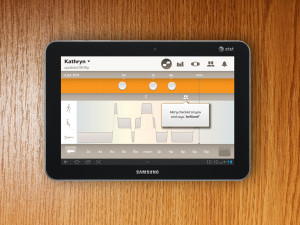

View Case Study
Proteus caregiving product leverages sensors and mobile devices to help families manage daily care.
Around the world populations are aging and chronic disease is spreading. Our healthcare infrastructure is struggling to support the surge in demand, and so the burden of care often falls to family caregivers. We need solutions to help these caregivers support their loved ones, without compromising their own health and wellbeing. Today’s families often live apart, and our early ethnographic research indicated that caregiving happens from a distance and requires a lot of guesswork. Staying connected and up-to-date with accurate information about how a loved one is doing is difficult. Quality in-home care can be hard to find and prohibitively expensive. Furthermore, there are few solutions available that provide families with the reassurance and real-time information they need to support daily care. Proteus’ sensor-based solution helps patients and caregivers manage their daily care by using unobtrusive wearable and ingestible sensors to capture information about medication-taking, activity and rest patterns and then sends this information to a secure cloud, where it is accessible via a web portal or mobile app by those who have had permission granted. The user interfaces have been designed to answer the specific questions asked by families caring for loved ones. The sensors capture large amounts of information, yet early research with our target users steered us away from typical graphs of metrics and towards developing integrated visualizations that quickly communicate daily patterns. The sensors are designed to blend into everyday life. To mark when medication is taken, customers simply take an additional tablet at every dose time. The tablet is inert yet has an FDA-cleared ingestible sensor inside that is activated by stomach fluid when swallowed, creating a heartbeat-like signal that is picked up by a wearable sensor worn as an adhesive patch on the torso. The patch can be worn during all activities, is replaced weekly, and has been designed and engineered to be comfortable and minimally noticed. Besides recording ingestion data from the ingestible sensor, the patch also captures other health-related metrics such as heart rate, activity and rest. Mobile connectivity is quickly becoming the most prevalent utility on earth, and we believe in its power to help families manage their daily care. Early commercial pilots have demonstrated strong benefits for families, with many customers persisting on the system well past the length of our initial contracts.
- Live Project Link: https://www.youtube.com/watch?v=pFBl5NG8Ido&feature=youtu.be
- Why this project is worthy of a UX Award:
The Proteus User Experience team found that the key to serving patients and their families is to understand the questions, show restraint and answer only those pertinent questions. For caregivers and patients, especially those new to mobile, less is more, and a clear and simple interface that indicates whether they are on track may be all that is needed. The Proteus team worked with families to design both a web portal and mobile app that can very quickly answer specific questions for caregivers: “Is my loved one taking their medications? Are they getting the daily activity they need to be healthy?” Through extensive usability testing, the team developed an interface where minimal actions produce rich – yet constrained - experiences, and non digital touch points are tailored to our audience (typically older and less tech savvy). The team seamlessly interweaved multiple touch points- software, hardware, packaging, instructional material and service components- to ensure successful product use, rather than focusing the user experience on the tablet app alone. In addition, the team introduced the service via an easy-to-use connectivity kit, instilling trust and setting the right foundation. The kit includes an Android tablet; as the team found the larger tablet to be less intimidating than a smaller mobile phone. Early research revealed a fear that the product would make a loved one’s daily phone call unnecessary. The Proteus solution is designed to make that phone call richer, not replace it. To emphasize this, the product requires direct conversation between customer and caregiver to initiate data sharing, and messaging capabilities are purposefully absent. The Proteus solution has the potential to fundamentally change today’s struggles of caring remotely for those who are aging and/or have chronic illnesses. These struggles take a significant toll on individuals, who are lonely and stressed; on families, who must manage complicated interconnected lives; and on society, where productivity drops when people step out of the work force to provide family care. Excellent design is required to achieve these challenging goals.
- Submitted By: Proteus Digital Health
See More 2014 Submissions >>